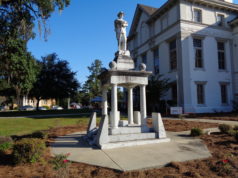April 19 is a big day in American history, maybe even the biggest.
Doesn’t ring a bell, huh? Here’s a clue.
It was a cool and misty morning.
Suddenly a shot rang out.
It was heard around the world.
Tomorrow is the anniversary of the battles of Lexington and Concord. Fought on April 19, 1775, the battles are considered the start of the American Revolution. The occasion is officially celebrated as Patriots’ Day in Massachusetts and Maine (the Mainers spell it Patriot’s Day), but it is largely ignored in the rest of the country. (Since 1969 Patriots’ Day has been observed on the third Monday of April, which this year was last Monday.)
The first shot, the one that is still echoing around the world 238 years later, was fired on Lexington Green as dawn was breaking.
No one knows who fired it.
It might have been a Brit. It might have been an American. It might have been a hothead with an itchy trigger finger, or a klutz whose gun accidentally discharged. No one knows.
Here’s what’s known. On the evening of April 18, a force of 700 British troops under the command of Lt. Col. Francis Smith was ferried across the Charles River from Boston and began a 26-mile march to Concord, Mass., which was six miles beyond Lexington.
Their mission was gun control.
They had been ordered to seize and destroy military supplies, including weapons, ammunition and rations that the American militias had stockpiled in towns north and west of Boston.
Their raid was supposed to be secret, but Boston in 1775 was about as leaky as Washington, D.C., today.
The Americans knew days in advance that a raid was coming, and as soon as the op began (at about 10 p.m. on April 18) the Boston Committee on Public Safety dispatched horsemen, including Paul Revere and William Dawes, to alert the countryside that the Brits and trouble were on the way. Taking different routes, they both made it to Lexington, with Revere arriving first, and by 1:30 a.m. the town knew the British were coming.
Just as important, so did Samuel Adams and John Hancock, who had been hiding out in Lexington. They moved on and lived to sign the Declaration of Independence the following year.
The lead British units, about 100 men, were under the command of a British Royal Marine major named John Pitcairn, a highly respected officer. (Pitcairn Island, of Mutiny on the Bounty fame, was named after his son.) Pitcairn’s contingent arrived in Lexington at about 4:30 a.m. They were confronted on Lexington Green by 77 militiamen under the command of Captain John Parker, the local militia commander. He had called out the militia as soon as the town received the alert, and 130 answered the call. They mustered on the green, and after standing around in the dark for about an hour, Parker dismissed them with orders to return at the sound of a drum. Some went home and some repaired to nearby Buckman Tavern. When the drum sounded, 77 showed up. They were drawn up in two lines as hundreds of Brits marched down the road and onto the green. They must have been scared shitless.
One American recognized the situation for what it was — suicidal — and said so. “There are so few of us,” he said. “It is folly to stand here.”
“The first man who offers to run will be shot down,” Parker replied.
The Brits started moving up at double time.
“Stand your ground!” Parker ordered. “Don’t fire unless fired upon! But if they want to have a war, let it begin here.”
Some of his men started to drift away.
Pitcairn and two other officers rode to the front of his troops, about 100 feet from Parker’s line.
“Lay down your arms, you damned rebels, and disperse!” he shouted.
Parker finally concluded that resistance was futile and ordered his men to disperse. They began to leave, but did not disarm.
“Lay down your arms, damn you! Why don’t you lay down your arms?” Pitcairn shouted.
“Damn them! We will have them!” cried one of Pitcairn’s officers, meaning the rebels’ muskets.
That was when the historic shot rang out.
It was followed almost immediately by an order from one of the British officers to “Fire, by God! Fire!” One platoon let loose a volley that missed.
Pitcairn struck his sword downward as a signal to cease firing, but his troops were too jacked up to stop. There was another volley that tore into the retreating militiamen, answered by a few desultory shots from the Americans.
Then the Brits charged. The remaining Americans ran. The Brits kept firing at them until they were out of range.
When the shooting stopped, eight Americans were dead. Ten others were wounded, but escaped.
British casualties consisted of one private with a relatively minor leg wound. Pitcairn’s horse sustained two grazing wounds.
The Brits reformed their ranks and marched on down the road to Concord.
For the single most transformative revolution in human history, it wasn’t the most auspicious of beginnings.
Fortunately things got better for the Patriot cause as the fighting moved to Concord, where a much larger militia force forced the British to begin a retreat under fire that continued all the way back to Boston.
When the fighting was over, the final casualty counts were these. The Brits had 73 killed and 174 wounded, a number of whom subsequently died. There were 49 Americans killed, and 39 wounded. Taken together, the two battles were an American victory.
The fighting at Concord around the North Bridge inspired Ralph Waldo Emerson’s 1837 poem “Concord Hymn,” in which the phrase “the shot heard round the world” first appeared, even though the first shot was fired at Lexington. Here’s the first stanza:
By the rude bridge that arched the flood,
Their flag to April’s breeze unfurled,
Here once the embattled farmers stood,
And fired the shot heard round the world.
Modern accounts of the battle of Lexington (including the one in Christopher Ward’s massive work, The War of the Revolution, from which most of the foregoing description of the battle is drawn) usually neglect to mention the names of the eight who fell there.
It’s an omission that has always troubled me. So here they are:
John Brown
Samuel Hadley
Caleb Harrington
Jonathan Harrington
Robert Munroe
Isaac Muzzy
Jonas Parker
Asahel Porter
Tomorrow is their day. I think a decent respect for the gallantry of ordinary men requires that their names be honored on it.
Respond: [email protected]














